This is the first in a two-part series discussing the 2017 Kenyan elections. See here for more information on specific issues facing the candidates during the election. For recent news around the elections, see this week’s Africa in the news.
Kenya holds its general election this coming Tuesday, August 8, 2017, the second time since the promulgation of the country’s new constitution in August 2010. This constitution established a devolved system of government with a national government and 47 county governments. As such, in this election, Kenyans will elect the president, county governors, county members of the Senate, county women representatives, members of parliament, and members of county assemblies. Notably, the two main contenders for the presidency are incumbent President Uhuru Kenyatta running on the Jubilee Party of Kenya ticket and former Prime Minister Raila Odinga on opposition ticket National Super Alliance.
Preparing for election day and overcoming turbulence
Kenya has established a solid legal framework to ensure the integrity of the electoral process, fair competition, and security of the votes.[1]
Besides the legal framework, institutional mechanisms for the preparation of election are also entrenched in law. The Independent Electoral and Boundaries Commission (IEBC) is responsible for conducting the general election. Although a new team of commissioners assumed office in late 2016, the preparedness by the electoral body is comparatively much better with lessons learned from 2013 elections. For example, to enhance security of the August vote, three technology companies have been contracted by IEBC to protect the credibility of the polls with the highest form of digital security. Enhanced security features of the presidential ballot papers with embedded watermarks and an anti-copy pattern, which makes it easy to determine whether ballot is genuine, should help prevent counterfeits. Further, as required by the Elections Act Amendment Bill 2016, the IEBC has deployed and trained staff on the integrated election management system for voter registration, voter identification, and electronic results transmission.
These efforts notwithstanding, several battles have characterized this year’s general election. Some of the most contentious issues included:
- Whether August 8 would be the voting date;
- When to appoint a new team of Commissioners at IBEC to take office with enough time to prepare for the election;
- Questions regarding the provisions for resignation of a civil servant running for office, especially whether they can return to their positions if they lose (the ruling is that they can);
- The choice of backup mechanism for electronic voting;
- The auditing of the voter register to remove deceased voters;
- Issues over the role of the IEBC in tallying and announcing presidential votes; and
- Disagreements on the procurement of printing the presidential ballot papers.
Delays in court rulings also left some processes, such as the procurement of the Kenya integrated elections management system, a little too near the elections.
Political parties and coalitions
This election is large: There are only 1,882 available elective positions, but they have attracted a total of 11,330 candidates (among them eight presidential candidates), most sponsored by various political parties but also 3,752 independent candidates.[2]
Like in previous general elections, this year’s election has witnessed a realignment of political parties as well as the establishment of new ones. Currently, there are 63 registered and participating political parties in the general elections, often grouped by coalitions.[3] The Coalition for Reforms and Democracy (CORD) alliance formed for the 2013 elections has now brought on board other smaller parties to form the National Super Alliance, while the Jubilee coalition has transformed into Jubilee Party of Kenya with the member parties dissolved. So, in 2017, the Jubilee Party of Kenya, headed by incumbent President Uhuru Kenyatta is facing off against the National Super Alliance as the key political players.
Gender parity
The Kenyan Constitution is rather progressive in terms of achieving gender parity: Article 27 (8) of the constitution states that, the State “shall take legislative and other measures to implement the principle that not more than two-thirds of the members of elective or appointive bodies shall be of the same gender.” In addition, the constitution reserves 47 seats for women in the National Assembly (women representatives from the 47 counties), and 16 seats are reserved for women in the Senate.
Despite these provisions, the government has yet to live up to this goal: The outgoing parliament has only 86 female legislators, 21 percent below the minimum mandated representation of 33 percent. In the 2013 general elections no female senator was elected and neither was a female governor. At that time, the Kenyan Supreme Court ruled that the two-thirds gender representation could be implemented progressively and asked the National Assembly to enact an appropriate law to provide a framework to achieve this goal. That parliament, however, failed.
As we go into this election, though, there is a high probability that female governors and senators are elected, as the number of female contenders has grown due to the attention given to the Gender Bill and the awareness of the issue increased by community-based organizations.
A peaceful election is the overriding objective
A peaceful election requires collective efforts from all stakeholders, and so far, the top presidential contenders have declared they will concede to a fair defeat. There are legal and peaceful mechanisms for disputes over results,[4] which CORD utilized in 2013, filing a petition in the Kenyan Supreme Court challenging the outcome of the election but their case was dismissed after a hearing by the seven justices. The chief justice has reassured Kenyans that the justice system is ready to hear any election petitions in timely manner.
The aftermath of the 2007-2008 post-election violence has prepared officials to mitigate against such an occurrence. Policing agencies have deployed officers to ensure that peace is maintained during the election process throughout the country. Similarly, the national and county governments are working together with community and faith-based organizations to implement a nation-wide civic education program on the need for peace and, in the process, developed an early warning system. To this end, government policing agencies have already mapped out potential areas for violence and necessary prevention measures put in place. Furthermore, the National Cohesion and Integration Commission of Kenya has trained citizens and police officers to monitor hate speech from politicians.
The private sector is significantly affected when there is political-related violence. In this regard, the Kenya Private Sector Alliance and Kenya National Chamber of Commerce and Industry have been holding forums with the political parties and urging for peace ahead of the polls. The media has also kept politicians in check as far as their public pronouncements are concerned through regular columns with fact checking, and, in the process, educate the public.
Footnotes
[1] Locally, this includes the 2010 Constitution of Kenya as the supreme law, as well as the Independent Electoral and Boundaries Commission Act, the Elections Act, the Political Parties Act, the Leadership and Integrity Act, the Supreme Court Act, and the Election Campaigns Financing Regulations. In addition, the Assumption to the Office of the Governor Act has entrenched the handing-over of power among the county governors into law. Further, to deliver free and fair elections, Kenya is also a signatory to a number of major international instruments like the International Covenant on Civil and Political Rights, the International Convention on the Elimination of All Forms of Racial Discrimination, the African Charter on Human and Peoples’ Rights, and the Convention on the Rights of Persons with Disabilities.
[2] The large number of independent candidates is attributable to the Kenyan National Assembly passing a law barring party hopping. The law requires candidates interested in political position to choose their parties at least two months before the elections after which they are not eligible to change parties. Candidates dissatisfied with the party primaries have therefore opted to run as independents.
[3] The Political Parties Act stipulates that political parties can form coalitions before the election, while according to Article 91(1) of the Constitution, political parties are expected to have a national character. In this regard, the 2013 general elections saw the formation of Jubilee coalition made up of the United Republican Party (URP) of Kenya and the National Alliance (TNA), and the Coalition for Reforms and Democracy (CORD). For the 2017 election, URP and TNA have dissolved and merged with other smaller parties to form a single party known as the Jubilee Party of Kenya, which is in turn working with other smaller parties.
[4] In case a candidate feels aggrieved, Article 140 (1) of the Constitution of Kenya states that “A person may file a petition in the Supreme Court to challenge the election of the President-elect within seven days after the date of the declaration of the results of the presidential election.” Further, Article 140 (2) gives the timelines for the Supreme Court to make decision stating that “Within fourteen days after the filing of a petition under clause (1), the Supreme Court shall hear and determine the petition and its decision shall be final.”
REFERENCES
Government of Kenya (2010), The Constitution of Kenya. Nairobi: Government Printer.
Kenya National Bureau of Statistics (2017), Kenya Economic Survey 2017. Nairobi: Government Printer
Barkan, Joel D. (2001), “Elections in Developing Countries,” in Richard Rose ed., International Encyclopedia of Elections , Washington D.C.: CQ Press.
Lust-Okar, Ellen (2004), “The Management and Manipulation of Political Opposition,” Comparative Politics, 36 (2), pp. 159-179.
Diamond, Larry (1999), Developing Democracy: Toward Consolidation, Baltimore: Johns Hopkins University Press.
Transition to Devolved Government Act, 2012. National Council for Law Reporting. The Attorney General.
Nyanjom, O (2011), “Devolution in Kenya’s new Constitution.” Constitution Working Paper Series No 4. Society for International Development, SID.
https://www.iebc.or.ke/resources/?List_of_Candidates_for_2017_General_Elections. Accessed on 1st August 2017.
The Brookings Institution is committed to quality, independence, and impact.
We are supported by a diverse array of funders. In line with our values and policies, each Brookings publication represents the sole views of its author(s).


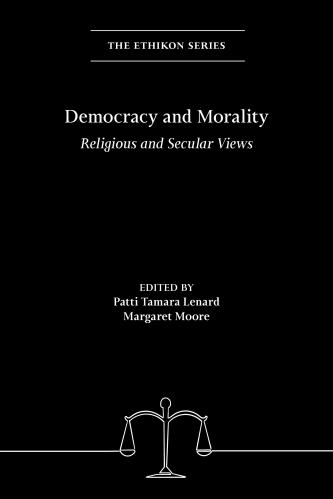

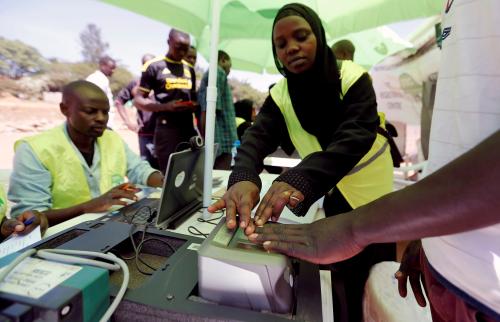
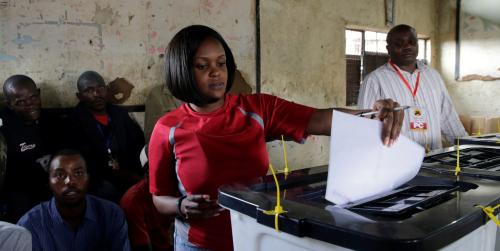
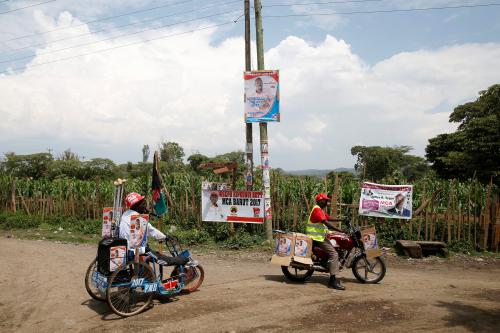
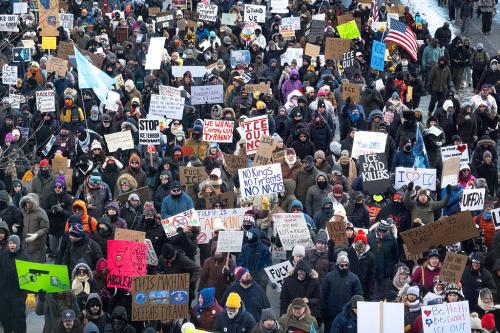


Commentary
Kenya’s election 2017: Unique concerns for a unique country
August 4, 2017